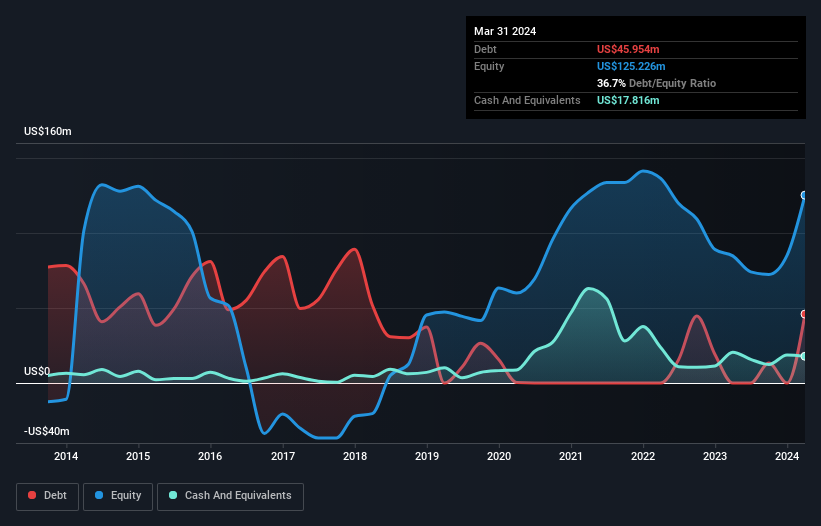Some say volatility, rather than debt, is the best way to think about risk as an investor, but Warren Buffett famously said that 'Volatility is far from synonymous with risk.' So it seems the smart money knows that debt - which is usually involved in bankruptcies - is a very important factor, when you assess how risky a company is. Importantly, Turtle Beach Corporation (NASDAQ:HEAR) does carry debt. But is this debt a concern to shareholders?
When Is Debt Dangerous?
Debt and other liabilities become risky for a business when it cannot easily fulfill those obligations, either with free cash flow or by raising capital at an attractive price. If things get really bad, the lenders can take control of the business. While that is not too common, we often do see indebted companies permanently diluting shareholders because lenders force them to raise capital at a distressed price. Having said that, the most common situation is where a company manages its debt reasonably well - and to its own advantage. The first thing to do when considering how much debt a business uses is to look at its cash and debt together.
Check out our latest analysis for Turtle Beach
How Much Debt Does Turtle Beach Carry?
You can click the graphic below for the historical numbers, but it shows that as of March 2024 Turtle Beach had US$46.0m of debt, an increase on none, over one year. However, it also had US$17.8m in cash, and so its net debt is US$28.1m.

A Look At Turtle Beach's Liabilities
We can see from the most recent balance sheet that Turtle Beach had liabilities of US$76.8m falling due within a year, and liabilities of US$56.4m due beyond that. On the other hand, it had cash of US$17.8m and US$42.9m worth of receivables due within a year. So its liabilities outweigh the sum of its cash and (near-term) receivables by US$72.4m.
This deficit isn't so bad because Turtle Beach is worth US$320.5m, and thus could probably raise enough capital to shore up its balance sheet, if the need arose. However, it is still worthwhile taking a close look at its ability to pay off debt. When analysing debt levels, the balance sheet is the obvious place to start. But it is future earnings, more than anything, that will determine Turtle Beach's ability to maintain a healthy balance sheet going forward. So if you want to see what the professionals think, you might find this free report on analyst profit forecasts to be interesting.
In the last year Turtle Beach wasn't profitable at an EBIT level, but managed to grow its revenue by 7.2%, to US$263m. We usually like to see faster growth from unprofitable companies, but each to their own.
Caveat Emptor
Importantly, Turtle Beach had an earnings before interest and tax (EBIT) loss over the last year. To be specific the EBIT loss came in at US$11m. Considering that alongside the liabilities mentioned above does not give us much confidence that company should be using so much debt. So we think its balance sheet is a little strained, though not beyond repair. We would feel better if it turned its trailing twelve month loss of US$11m into a profit. So in short it's a really risky stock. The balance sheet is clearly the area to focus on when you are analysing debt. However, not all investment risk resides within the balance sheet - far from it. Be aware that Turtle Beach is showing 1 warning sign in our investment analysis , you should know about...
Of course, if you're the type of investor who prefers buying stocks without the burden of debt, then don't hesitate to discover our exclusive list of net cash growth stocks, today.
Valuation is complex, but we're here to simplify it.
Discover if Turtle Beach might be undervalued or overvalued with our detailed analysis, featuring fair value estimates, potential risks, dividends, insider trades, and its financial condition.
Access Free AnalysisHave feedback on this article? Concerned about the content? Get in touch with us directly. Alternatively, email editorial-team (at) simplywallst.com.
This article by Simply Wall St is general in nature. We provide commentary based on historical data and analyst forecasts only using an unbiased methodology and our articles are not intended to be financial advice. It does not constitute a recommendation to buy or sell any stock, and does not take account of your objectives, or your financial situation. We aim to bring you long-term focused analysis driven by fundamental data. Note that our analysis may not factor in the latest price-sensitive company announcements or qualitative material. Simply Wall St has no position in any stocks mentioned.
Have feedback on this article? Concerned about the content? Get in touch with us directly. Alternatively, email editorial-team@simplywallst.com
About NasdaqGM:TBCH
Turtle Beach
Operates as an audio technology company in North America, Europe, the Middle East, and the Asia Pacific.
Very undervalued with proven track record.
Similar Companies
Market Insights
Community Narratives



